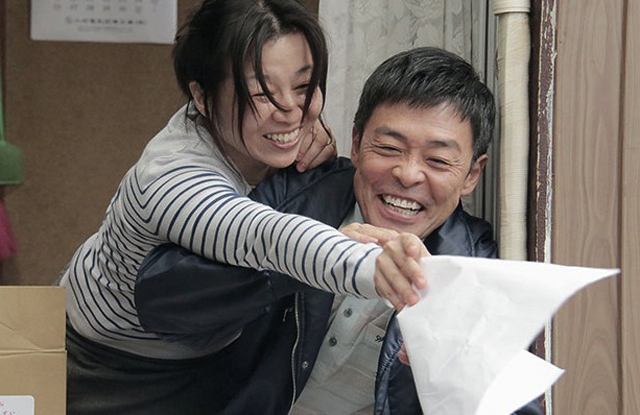CHICAGO – In anticipation of the scariest week of the year, HollywoodChicago.com launches its 2024 Movie Gifts series, which will suggest DVDs and collections for holiday giving.
Interview: Next Asian Pop-Up Cinema is ‘Three Stories of Love,’ Premiering on April 6, 2016
CHICAGO – Named one of the best Japanese films of 2015, “Three Stories of Love,” directed by Ryosuke Hashiguchi, will be the next screening for the Asian Pop-Up Cinema series on Wednesday, April 6th, 2016 – at the AMC River East 21 in Chicago – and Sunday, April 10th at the Wilmette (Illinois) Theatre.
This film was highly anticipated, since it was Hashiguchi’s (“All Around Us”) first feature in seven years. The work is an artistic experiment of sorts, as the director auditioned for his actors first, then wrote specific stories around them. The result is a detailed depiction of the tribulations of life and the associative emotions. The Asian Pop-Up Cinema is is a revolving showcase of diverse Asian films, highlighting Cantonese, Mandarin, Japanese and Korean offerings with English subtitles. For full schedule of the 2016 season, click here.

The Next Screening of Asian Pop-Up Cinema is ‘Three Stories of Love’
Photo credit: AsianPopUpCinema.org
The previous screening of the Pop-Up was director Tom Lin’s “Zinnia Flower.” This poignant meditation on life, death and mourning was a emotional demonstration of the filmmaker’s feelings – based on his own life incident – about two people who suddenly lose the loves of their lives and have to deal with the aftermath, as they follow the “100 Day” mourning ritual of Buddhism. “Zinnia Flower” is now available on DVD through Long Shong Entertainment, and is recommended to all those who are dealing with loss.
HollywoodChicago.com talked with Tom Lin last month, as he visited Chicago to present his film and answer audience questions at the Asian Pop-Up Screening event. The Taiwan-based filmmaker, who lived in the United States as a child, spoke of his path to making the film and how it was based in part on his own life.
HollywoodChicago.com: So much of the healing with the characters had to do with moments of art, and artistic expression. What statement did you want to make about the power of art to heal?
Tom Lin: It wasn’t a direct statement, per se, but the whole film was cathartic – in an art and healing sense – for me. When I was writing the script I was looking for audio and visual connections to the character’s partners. It wasn’t so much the art as the ritual of how these arts are associated with people.
HollywoodChicago.com: The actors who portrayed Yuwei and Yuwei’s brother both had to have extreme crying scenes. In your culture, what is the attitude towards men who cry, and were you saying something in the film by allowing these men to cry?
Lin: Men do cry in private, like the brother did, and I guess this came more organically from what was happening in the story. I didn’t really have a very detailed script, and a lot of the emotions in the film came from the actors. I didn’t specify with the Yuwei character what reactions he was suppose to have, it was just part of the situation and how the actor reacted to it, and how essential it was for the character at the points it happened in the film.
HollywoodChicago.com: There are a couple of religions at work in the film, and their attitudes toward the journey of the dead. Do you think religion in part developed because human beings want an explanation or hope associated with death?
Lin: Definitely, and it’s usually in the face of death that we even think about religion. We don’t think about religion in the sense of which one or which god, it’s the idea of where do we go or where does the departed go, and are they still around me? It’s about the afterlife, and what religion has the afterlife.

’Zinnia Flower,’ Directed by Tom Shu-yu Lin
Photo credit: AsianPopUpCinema.org
HollywoodChicago.com: There were two types of young couples involve in loss…one on the brink of marriage and one on the brink of family. What did you what to say about these types of relationships in dealing with the loss of partnership?
Lin: It was always about the pregnancy, and the loss of those two lives in one wife. When I began the other couple, they weren’t engaged, they were just another couple. In talking to the actress, she brought up the Asian cultural point that if they were not married, she wouldn’t be connected to his family at all. So the engagement was a way to show that contrast, as to being family or not. As I began the outline, it was to be a mirror between a man and a woman dealing with grief, and then it got more specific as we went along.
HollywoodChicago.com: In exploring the emotion of loss, what do you think would be different in a relationship of 40 or more years, when a partner is gone? How do you think that would be different than the younger couples?
Lin: I think there is more of a co-dependency in a longer relationship, so I think the mourning would be deeper and longer, plus it’s difficult to get used to being alone again. There just more going on in that scenario.
HollywoodChicago.com: You show Yuwei seeking comfort by having sex, and Ming seeks comfort through the rituals of a lost honeymoon. What do you think your main statements were on the difference between men and women in mourning?
Lin: I wanted the man to have a grief that was more forcefully externalized, and for the female to be more internal in her mourning – she was more in denial. By the end of the film, however, one method is not better than another, each went through some of the same things, except in different ways. It’s human.
HollywoodChicago.com: You dedicated this film to your own loss, and spoke of using the creation of it as a catharsis for your own healing. Which scene was most difficult to write and film, in the sense it was your most personal statement?
|
Director Tom Lin of ‘Zinnia Flower’ Photo credit: Patrick McDonald for HollywoodChicago.com |
Lin: Any scene that involved family or relatives were the most difficult to create scenarios for, in the sense that my family would be seeing the film. I didn’t want anybody to think ‘does that how he see me?’ I was very careful about that, but still I wanted to have those scenes have integrity for the characters and story.
HollywoodChicago.com: The last image in the film symbolizes a new phase of journey, yet one of the characters is still resisting it. Was there a point in your mourning when life was so present that you had to start a new journey despite how you still felt?
Lin: Personally, it was probably a step-by-step process through the whole ‘100 Days.’ I had great friends, who were also trying to get me back to life. My journey was exterior-wise, a lot different than the characters in the film. But the 100 Day ritual was the same, which was very helpful, especially in its repetition. You begin to wonder why you’re doing it, and when that happens, the answers start to emerge.
That is why I included the ‘chapter’ slides in the film, which described the ritual process, and where the spirit should be. There are also hundreds of other people participating, and the fact that others are going through their own loss, makes it very healing. It was on that part of journey that inspired me to write this script. At that point, that was it for me, and afterward began the process that became the film.
 | By PATRICK McDONALD |


